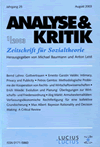Suchergebnisse
"John Christman"
Titel: Freedom in Times of Struggle: Positive Liberty, Again
Autor: John Christman
Seite: 171-188
Many of those critical of traditional liberalism have focused on the notion of freedom at the center of that approach, namely the (negative) idea of liberty as the absence of interferences with action. Building a plausible and normatively acceptable positive alternative, however, has faced numerous criticisms and challenges. In this paper I discuss what such critics of liberalism see as the limitations of the traditional negative notion and sketch the core components of a positive alternative. Specifically I suggest that the dimensions of liberty should contain the positive elements of capabilities and agent authenticity. After laying out the core of these ideas I briefly defend them against standard objections. In doing so, I argue that such a positive notion is necessary to capture the dominance of the language of freedom in contexts of resistance and struggle in the actual, non-ideal, world.
Titel: Autonomy, Recognition, and Social Dislocation
Autor: John Christman
Seite: 275-290
Abstract: In numerous accounts of both autonomy and freedom, social or relational elements have been offered as conceptual requirements in addition to purely procedural conditions. In addition, it is claimed that social recognition of the normative authority or self-trust of the agent is conceptually required for autonomy. In this paper I argue that in cases where people find themselves completely dislocated from the social and cultural homes that had provided them with the language in which to formulate and express their values, it is clear that social recognition of the sort defended in relational models is causally but not conceptually required for agency to be (re-)established. This is shown by noting that often victims of human trafficking or smuggling find themselves in foreign settings where it is quite up for grabs where and how they will attempt to reconstruct a life narrative which they can generally embrace. Therefore, seeing social recognition as conceptually required for autonomous agency or freedom would ignore the variability in the ways that such recognition must be expressed.

The Normative Turn from Marxism
2015 (37) Heft 1
Editorial
Marxism, both as a Western political movement and an intellectual focus of dispute, lost its academic appeal during the 1970s and 80s, foreshadowing the collapse of `actually existing´ socialism in the early 90s. Within what after the Second World War was called `Western Marxism´, there had been growing awareness of Marx’s early philosophy with its suggestive, if somewhat vague, ideas of a universally productive life and an ideal productive society. In contrast, the stock of (not only offici...